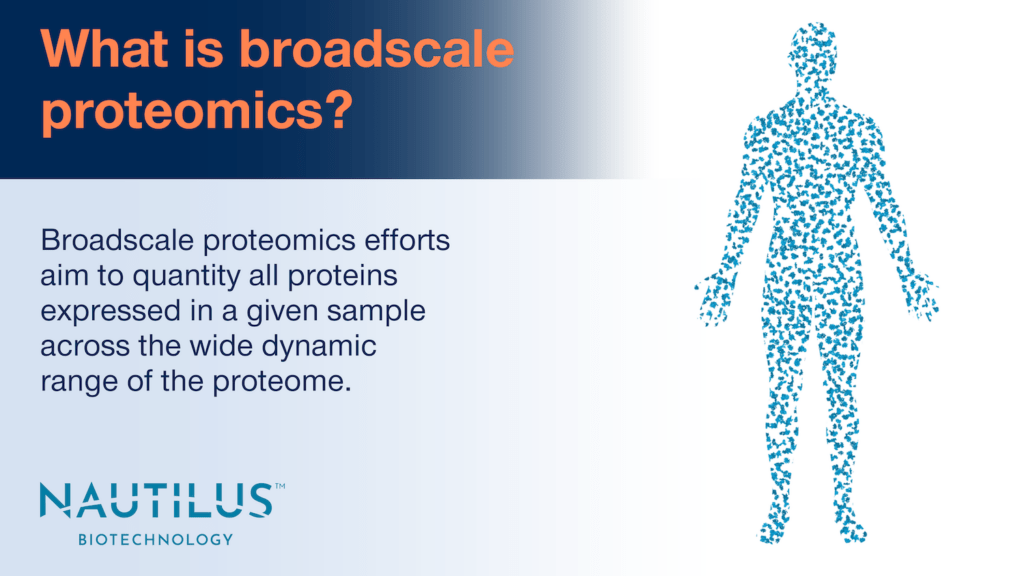
Broadscale proteomics efforts aim to quantify all proteins expressed in a given sample across the wide dynamic range of the proteome.
Often called “discovery proteomics” or “untargeted proteomics,” broadscale proteomics efforts enable researchers to identify protein changes associated with biological phenomena. These are contrasted with targeted proteomics studies, which set out to examine specific proteins or subsets of a sample’s proteome.
Broadscale proteomics studies do not require researchers to have hypotheses about which proteins or pathways change as a result of the phenomenon studied. Instead, researchers use broadscale proteomics techniques to compare the full proteomes of affected and unaffected samples and comprehensively identify changes in proteins and pathways.
Watch this animation for a visual dive into Nautilus’ broadscale proteomics methodology:
Dynamic range in broadscale proteomics
When studying complex biological phenomena, both high and low abundance proteins in the proteome can have tremendous impacts on function. For example, low abundance transcription factors or signaling molecules can set off cascades of events that greatly alter cell states. Changes in highly abundant proteins, on the other hand, can be indicative broad dysfunction. E.g., increased blood α2-Macroglobulin can indicate kidney dysfunction. Thus, when using broadscale proteomics techniques to search for differences between proteins in samples affected by a given phenomenon, it is essential to measure both high and low abundance proteins.
Covering the wide dynamic range of the proteome is very difficult. Proteins can be found at abundances spreading over 10 orders of magnitude. Most current proteomics technologies achieve wide dynamic range by adopting complicated, time and resource-intensive workflows. We are developing the NautilusTM Proteome Analysis Platform to address exactly this issue and are building accessibility into everything from sample preparation to data analysis. Check out this blog post to learn how we’re designing the Nautilus Platform to achieve broadscale proteomic analysis covering the incredible dynamic range of the proteome.
Charting entire research paths with broadscale proteomics
Broadscale proteomics efforts have many applications. They may, for example, identify potential drug targets, and follow-up work will elucidate the targets’ roles in the condition of interest. Later, drugs that activate or inhibit these targets will need to be designed, synthesized, and tested. Researchers can further use broadscale proteomics to test these drugs and ensure they have the desired effects with minimal off-target effects.
Given that broadscale proteomics studies can direct entire research programs in this way, it is incredibly important that researchers trust their findings. Indeed, the ideal broadscale proteomics technique will be reproducible and robust enough that it can be easily repeated across labs.
The complexity of traditional proteomics techniques often limits their reproducibility, but we have designed the Nautilus Proteome Analysis Platform with reproducibility and robustness at its core. We believe our platform will reliably launch myriad research efforts and vastly accelerate basic research, biomarker discovery, drug development, and more.
MORE ARTICLES


